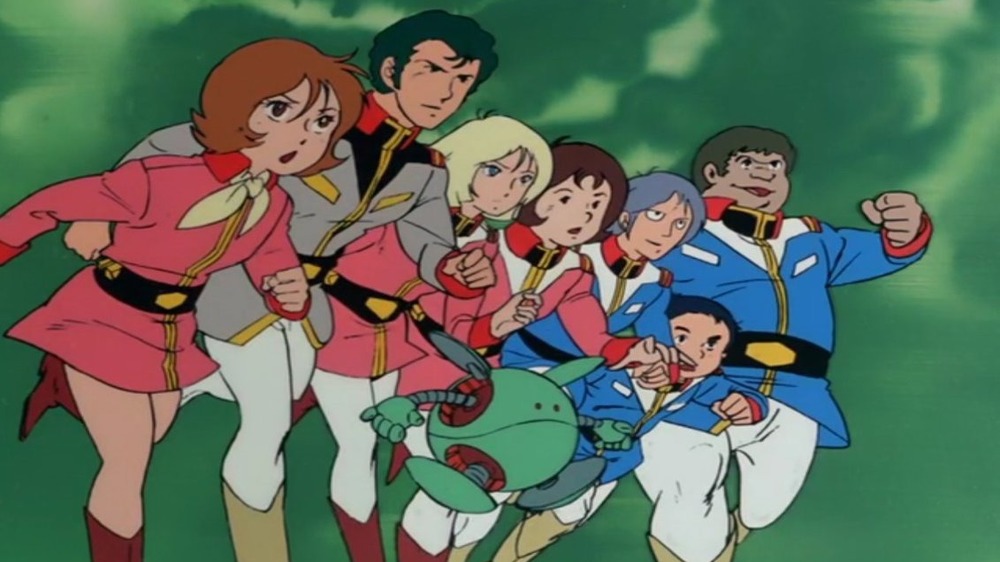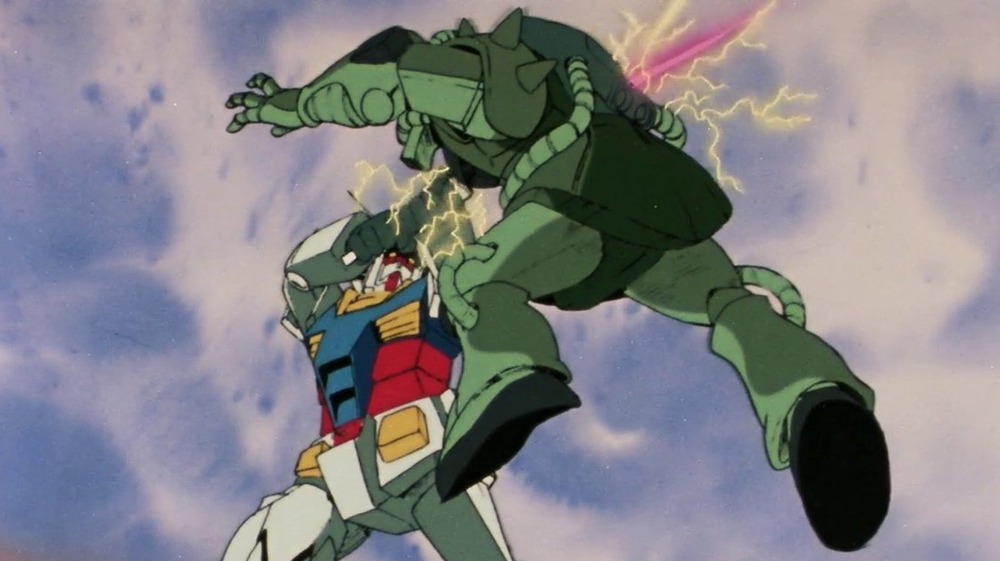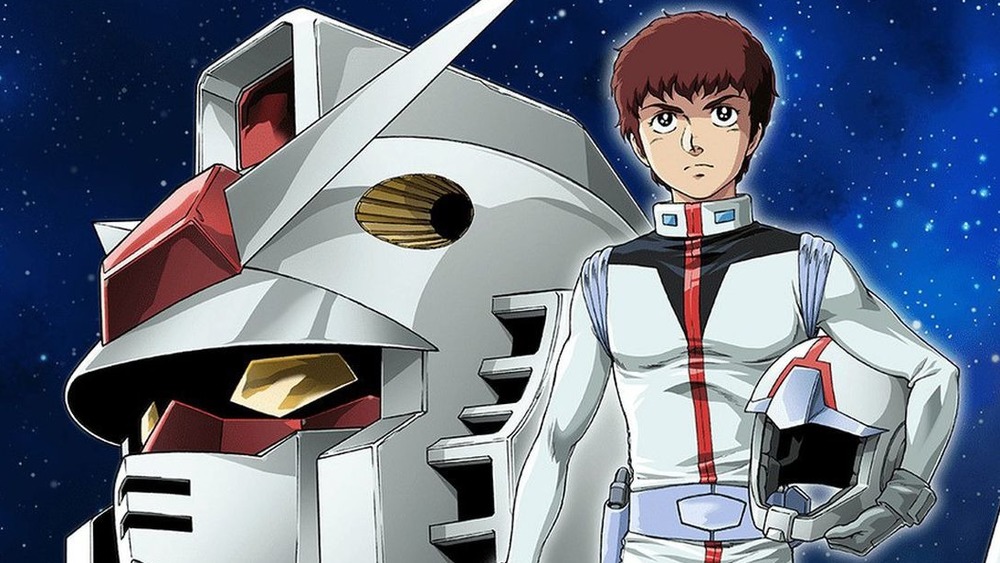The Ending Of Mobile Suit Gundam Explained
Japanese anime is a genre of media that really started gaining traction in the 1960s, spreading throughout the country — and later the world — in the years and decades following. Anime consists of a style of animation unique to Japanese productions spanning all genres, subjects, and audiences. Although it began as hand-drawn art, anime adapted with changing technology and now works with both hand-drawn and computer-animated art. In anime of the 1980s, the giant robot genre, also known as "mecha," really started to come into focus and gain popularity. One anime that played a very big role in this was Mobile Suit Gundam, helping grow the genre and anime overall to be as popular as it is today.
In 1979, Yoshiyuki Tomino created the sci-fi anime series, set in a futuristic world in which the Earth Federation and the Principality of Zeon, another nation gaining power throughout space, go to war with each other. Mobile Suit Gundam originally ran for 48 episodes in 1979 and 1980, but it was later broadcast throughout the world. Mobile Suit Gundam aired in the US on the Toonami programming block of Cartoon Network in 2001. Now in 2021, the series has come back around and is available to stream on Crunchyroll.
To help out any new Mobile Suit Gundam fans, or those rewatching, here's the ending of Mobile Suit Gundam — explained.
The Principality of Zeon vs the Earth Federation in a battle of technology
In the futuristic world of Mobile Suit Gundam, the war between Earth and Zeon has been leaning in the latter's favor due to their more advanced technology of mobile suit weapons. When the war settles into a stalemate, Earth begins developing their own mobile suit technology prototypes. Unfortunately, Zeon learns of their existence and attacks the White Base where they are stored. All but one of the suits, a giant robot called the RX-78-2 Gundam, are destroyed along with the pilots. A 15-year-old engineer named Amuro Ray enters the suit to fight off the Zeon forces and finds out that he's a natural pilot, helping a small group escape.
Over the course of the series, White Base and Gundam are chased by a Zeon commander named Char Aznable, the main antagonist of the series and Amuro's archenemy. While Amuro and the other survivors attempt to save the Earth Federation, developing more mobile suits, Char works to get revenge on the ruling Zabi family of Zeon for killing his father. At one point, Amuro meets a girl named Lalah Sune and falls in love with her, only to find out that she is loyal to Char, her guardian. In the end, she sacrifices herself to stop Amuro from killing Char, and each blames the other for her death.
As the war between Earth and Zeon comes to a head, Amuro and Char have a final battle, one-on-one. Thankfully, they both eventually come to their senses, and Char leaves to complete his real mission and destroy the Zabi ruling family. He succeeds, and in the aftermath, Earth and the new Republic of Zeon are able to sign a peace treaty, ending the One Year War.
The themes of Mobile Suit Gundam
Mobile Suit Gundam deals with a lot of very serious, adult topics such as war, sacrifice, and violence. The series tells the story of a war between two nations based on a fight for control and power over technology and land. The creator has stated that he drew inspiration from the Cold War and other major conflicts throughout history. In a press conference he gave, Yoshiyuki also explained how Mobile Suit Gundam portrays all the characters, protagonists and antagonists, as complex people with depth of character (via Anime News Network). He said that, "for the first time, we introduced human beings as both heroes and villains, meant that over time, as the storyline progressed, sometimes people would change sides. You can see this was a completely radical approach for this genre."
When the series aired on Cartoon Network, it was unfortunately right around September 11, 2001. After the tragic event, a lot of TV stations were cancelling or editing their programming to limit content revolving around war, death, and similar topics. Because of this, Mobile Suit Gundam was removed from the schedule for a time, and when it finally returned to the air the rest of the episodes were edited (Anime News Network). The subject matter of Mobile Suit Gundam is still just as relevant today, maybe even more so, as we develop more and more advanced technology. We aren't that far off from Gundam suits. Along with that, the story of Amuro, a teenager thrust into the horrors of war with no experience, only to completely lose his innocence and optimism, is a story for the ages.
The start of the Gundam franchise
After Mobile Suit Gundam, the property quickly became a full-blown franchise, and it hasn't stopped growing since. There have been either television series or movies released in nearly every single year since 1980, around 50 in total so far. A new anime series, SD Gundam World Heroes, will premiere in April 2021, and you can catch the episodes on the Gundam YouTube channel (via Geek Native). Along with that, Hypebeast reported that a live-action series titled Gundam Build Real will premiere on March 29, 2021. Over the years, the Gundam franchise has expanded to other mediums as well, including novels, manga, and video games.
The Gundam anime has had a very visible influence on both Japan and the world. Within Japan, the Gundam franchise's popularity can be compared to Star Wars in the US. The series has even inspired multiple theme park rides, like the Gundam Crisis ride currently at Fuji-Q Highland Amusement Park. Most recently, Japan constructed a life-size, moving Gundam robot at the Yamashita Pier in Yokohama, and the "mobile suit startup experiment" will be open until March 31, 2022 (Gundam Factory Yokohama).
The Gundam franchise might even be heading to Hollywood, as it was reported in 2019 by Deadline that Brian K. Vaughan, a renowned comic book creator and screenwriter, would be writing the script for a live-action Gundam film. The news came a month before the franchise's 40th anniversary. Since then, there has been no further news, but considering the many delays caused by COVID-19, that doesn't necessarily mean the project's been scrapped or forgotten. Fans of Mobile Suit Gundam will just have to wait and see what the future holds.



